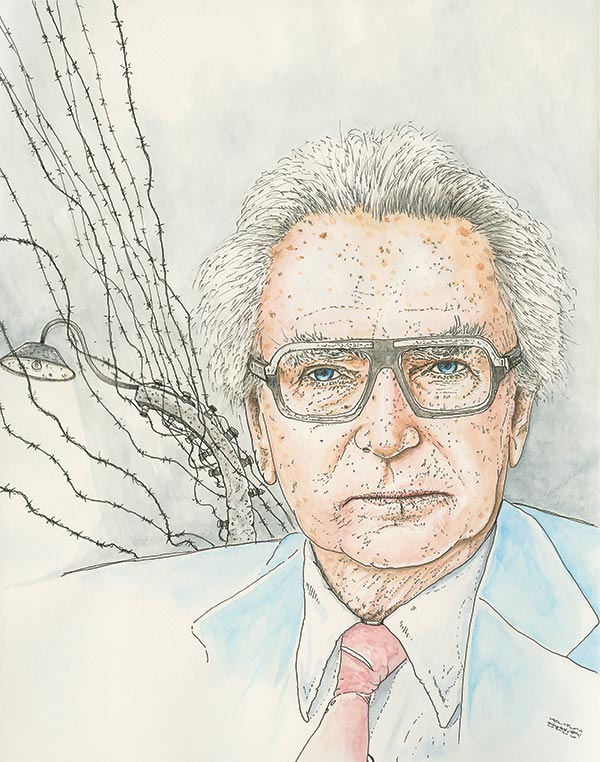Subtotal: $
Checkout-

The Joys of Tech Asceticism
-

Readers Respond: Issue 15
-

Family and Friends
-

How to Homestead a Hermitage
-

Awake the Harp
-

The Ministry of Reconciliation
-

The Immortality Machine
-

The Immortality Delusion
-

Simulating Religion
-

Insight: Finding Someone to Worship
-

The Pencil Box
-

Why Children Need White Space
-

Insight: Friedrich Froebel
-

The Technology of Gender
-

Digging Deeper: Issue 15
-

The Gods of Progress
-

Anabaptist Technology
-

Your Neighbor Lives Next Door
-

Insight: Why I Am Not Going to Buy a Computer
-

The Perfect Tool
-

Endangered Habitat
-

The Pen and the Keyboard
-

Meet a True Story
-

A poem for my son about grace
-

Editors’ Picks Issue 15
-

The Soul of Work
-

Go On, Inner Man

“Why do you not commit suicide?” With this question, psychiatrist Viktor Frankl offered his patients a key with which to unlock the chains of their afflictions. What, he was asking them, gave meaning to their lives? And his patients responded. Here was a doctor they could trust, whose theories were backed by personal experience.
Frankl was born March 26, 1905, in a Jewish section of Vienna, Austria. In 1921, at age sixteen, he gave his first lecture on “The Meaning of Life”: he was already forming his philosophy of psychological healing through the discovery of meaning, an approach he would call Logotherapy.
Contrary to Sigmund Freud, Frankl affirmed that people are spiritual beings with free will, not just organisms responding reflexively to their environments. They are thus responsible for shaping their lives by choosing and working toward meaningful goals. The psychiatrist doesn’t tell the patient what those goals should be, but helps the patient in a quest to discover them.
Frankl specialized in the treatment of depression and suicide at the University of Vienna, organizing a counseling program for students in 1930. He then began his own practice, but after the Nazi invasion of Austria in 1938 he was prohibited from treating non-Jewish patients. He became the director of a clinic for Jews where, at risk of his own life, he made false diagnoses to protect the mentally ill from euthanasia. It was under these conditions that he began writing his book Ärztliche Seelsorge, published in English as The Doctor and the Soul.
In 1939, Frankl could have immigrated to the United States, but chose to stay with his elderly parents. Three years later, he, his parents, and his wife, Tilly, were sent to the Theresienstadt concentration camp. Frankl and Tilly had married the previous year; the Nazis had forced her to abort their expected child.
Within half a year of arriving at the camp, Frankl’s father died. Frankl, Tilly, and his mother were sent to Auschwitz in 1944. Frankl’s mother was taken directly to the gas chamber. Tilly was moved to Bergen-Belsen, where she died in 1945; Frankl was sent to be a slave laborer in a sub-camp of Dachau.

Jason Landsel, Viktor Frankl
At Dachau, Frankl started an underground psychiatric practice for suicidal prisoners: “We had to teach the despairing men that it did not really matter what we expected from life, but rather what life expected from us,” he explained later. The key to survival was to “listen to what your conscience commands you to do and to carry it out to the best of your knowledge.”*
After the Allied forces liberated the camp, he made his way back to Vienna, where he learned of the death of his wife and his mother. For a year, he was close to despair. But in 1946 he returned to work. “Despair is suffering without meaning,” he wrote. “If there is meaning in life at all, then there must be meaning in suffering.”
That year, over the course of nine days, he dictated his best-known book, published in English as Man’s Search for Meaning. At the heart of the meaning that we discover is love: “The salvation of man is through love and in love.”
*Source: Viktor Frankl: Man’s Search for Meaning (Beacon Press, 1959).
Already a subscriber? Sign in
Try 3 months of unlimited access. Start your FREE TRIAL today. Cancel anytime.






































Rosie
I have always had a found love for dr Frankel. But now more than ever. Thank you for the article
Forrest Schultz
WOW -- LOGOTHERAPY !! That really brings back memories from days of Yore -- the 1960s!!! I was then in my twenties and we talked about this a LOT, and I remember someone I knew who was just starting as a psychotherapist who used Logotherapy. Among young Christian thinkers then this was often regarded as the only kind of psychotherapy that was or could be Christian. And it was deep -- dealt with important things -- the purpose of life, etc. not just how to get over some neurosis. But since then times have changed and changed and -- now you do not hear anything about it anymore. I have not thought of it or heard of it in decades. What was really good about it is that it was based on MEANING -- what is the meaning of life?? Is anybody still doing Logotherapy now??? As I say, I have heard nothing about it in forever.